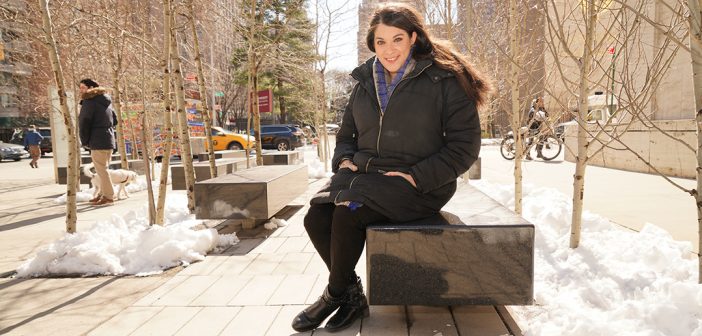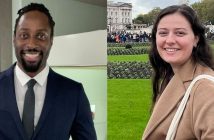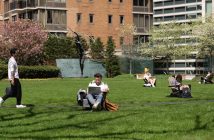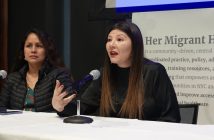Allison Marino was used to fundraising for good causes. She was special assistant to a CEO at an anti-poverty organization before deciding to go to the Graduate School of Social Service (GSS).
“I was raising a lot of money and I was enjoying the act of doing so, but I got frustrated with not having any say in the strategic way that money would get spent,” said Marino.
She was looking for a graduate program that would help her move into a leadership role in the policy or advocacy field, but also teach her more about the needs of the people and communities she wanted to serve.
At GSS, she found both. She chose to pursue the school’s leadership concentration. However, regardless of whether a student wants to work directly with clients or in administration, all GSS students must fulfill two field placements: one in their first year that is assigned to them, and one of their choosing in the second year.
While Marino knew early on she wanted to play a leadership role in her career, her first placement was very hands on. She was a forensic social worker for Legal Aid Society on Rikers Island.
Her role required her to assess incarcerated people and present her findings to their defense lawyers, who are looking for a social worker’s perspective in helping to build their case. In explaining the details of the incarcerated person’s life—their past, the issues they may be struggling with—she was able to help the defense explain what led to the person’s arrest in the first place. She also helped plan appropriate alternatives to incarceration.
It was a writing intensive placement, but Marino also had to be on hand to interview the client. She recalled her first visit to Rikers as particularly jarring.
“You have to take a bus over the bridge to get to the main gatehouse. I remember locking my stuff in the locker and taking another bus to the jail my client was housed in. The room was dark and claustrophobic,” she recalled.
When she reemerged to take the bus back over the bridge to go home, she found the daylight blinding and she was overcome with exhaustion.
“That’s when I realized I was acting as a bridge between the people I’m serving to the entire outside world,” she said. “They’re why I’m getting this education is—to be the best bridge I can be. The fact that it was painful to experience made me realize the power I have and how seriously I need to take this experience.”
Marino said that the hands-on experience was the very reason she wanted to pursue social work as a skillset to add to her development and administrative experience.
“When you’re sitting at a board table and able to advocate for people, it’s important to know the people you’re advocating for,” she said. “You’re affecting their lives by the decisions you’re making, and I thought that might be lacking in my experience.”
Marino’s second-year placement was at the New York City Mayor’s Office of Sustainably, which is not necessarily the sort of government agency one would associate with social work. Her supervisor, Nancy Wackstein, director of community engagement and partnerships, said that Marino’s past experience in the nonprofit sector made her a good match to work with a city agency.
“She had a great experience before she came here and it’s really a revolving door between city government and nonprofit leadership, so her getting experience in government will be a great asset going forward,” said Wackstein. “Social workers have a skillset and a particular world view, so whenever we think of the environment or transportation, low- and moderate-income people deserve a voice at the decision-making table—and that person should be a social worker.”
Whereas her previous placement was on the micro side of the practice, this role was far more macro, said Marino.
“I don’t know too much about the science of sustainability, but now I know intimately about the populations that environmental injustice impacts most directly,” she said.
She was part of an interdisciplinary team that examines policies and programs. Her team functioned as an internal consulting arm on sustainability for other agencies, such as the Department of Buildings and the Department of Transportation. She also helped bring specific projects to community boards and neighborhood-based organizations.
“Part of this intermediary role I play is to translate between what different groups of people need to hear, and how they need to hear it,” she said. “Policy people talk at a very high wonky level and that may actually turn some people off.
She used the example of solar panels, which before her internship she believed were only an option for the middle-class homeowner, not necessarily for renters. She said that unlike homeowners, most renters in New York can’t put a solar panel on top of their building. But through Con Edison, they can choose an electric company that uses renewable energy. This is something most renters are unaware of, she said, and need to be educated about.
“We have to think very differently about what is it that we’re asking people to do,” she said. “The city is actually promoting community-shared solar programs, which you could probably sign up for now if you’re a renter.”
In her role, she looked at what was working in other cities around the country and created a spreadsheet with all the programs she was impressed by.
“We researched every single policy or program that the mayor’s office could promote, fund, or create to deploy more solar in New York City.”
She said the strategic exercise is a macro social work skillset that city government needs more of, though it’s not necessarily something that agencies expect from a social worker.
“There is this big gap between the people who make the decisions and the people who are affected by them,” she said. “So being the person who can connect information by translating between the two, I think is an interesting space.”



